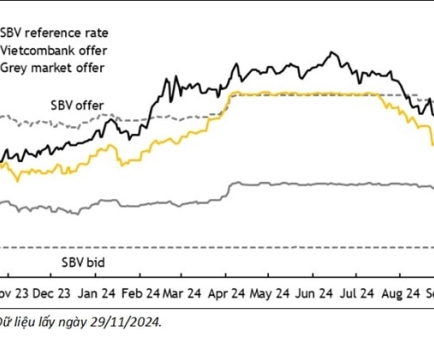Real estate bonds shackled by rules
Thu, 26 May 2022 15:50:00 | Print | Email Share:
Although experts believe that rating agencies are an indispensable element of a healthy and transparent market, and a significant fundraising channel, real estate developers may suffer hurdles due to stringent bond issuance rules.
| Real estate bonds shackled by rules - illustration photo |
At last week’s conference on corporate bonds held by the Vietnam Chamber of Commerce and Industry, experts discussed ways to develop an efficient and sustainable corporate bond market. One of the common recommendations regarded appropriate approaches to credit ratings.
According to Can Van Luc, BIDV’s chief economist, there should be clear regulations on credit ratings to help investors easily determine business quality and the risk level of the issued bonds.
“It is necessary to identify where a credit rating is mandatory and where a credit rating is encouraged. High-risk businesses should go through compulsory credit rating before bond issuance,” Luc said. “On the other hand, for businesses that have been audited and internationally rated with a long-standing history, a credit rating might not be necessary.”
In recent years, the State Bank of Vietnam (SBV) has steadily redirected loan flows towards industry, services and agriculture, to name a few, while reducing its exposure to the real estate sector.
Corporate bonds significantly expanded with a compound annual growth rate of 46 per cent between 2017 and 2021. In the span of those few years, the market has grown from 4.93 to 18.2 per cent of GDP. However, since 2017, the SBV’s tougher risk management measures to better minimise loan issuance risk have caused a slowdown in bank financing in real estate, translating into a higher risk-weight ratio for those sectors.
Circular No.22/2019/TT-NHNN released in 2019 on limits and prudential ratios of banks and foreign branches, which took effect in 2020, ordered commercial banks to lower the percentage of short-term financing utilised for mid- to long-term loans to 34 per cent by October 2021 and 30 per cent by this October.
“As a result, credit growth in the property sector has slowed from 26 per cent at the end of 2018 to 12 per cent at the end of 2021, and may drop further to 9-10 per cent in 2022,” wrote brokerage VNDIRECT. “To prevent property speculation, the SBV has mandated from April that banks strictly monitor credit in real estate and restrict credit to individuals who invest in premium and tourist properties, and those who hoard properties.”
In addition, the government has encouraged prudence in corporate bond due to rising risks of alleged breaches in issuances and land use rights auctions. Property corporate bonds, which accounted for 40 per cent of new issuance in 2021 and Q1 2022, had significant year-over-year growth of 73.1 per cent and 25.2 per cent, respectively.
To avoid additional risks and increase market transparency, the Ministry of Finance (MoF) has revised the regulatory framework to impose stronger restrictions.
The SBV shall supervise and inspect credit institutions investing in corporate bonds, providing underwriting, investment, and distribution services for corporate bonds, particularly those of real estate enterprises, enterprises with large issuance volumes and high interest rates, or enterprises with negative business results and no collateral.
“Thus, we anticipate that corporate bond issuance, particularly in the real estate sector, will be severely constrained in the coming quarters,” VNDIRECT noted.
Trinh Thai, analyst at SSI commented, “Concerns about a regulatory crackdown have made real estate businesses hesitant to issue further bonds. April’s real estate corporate issuance was a far cry from the monthly average of bond issuance in 2021.”
At last week’s conference, Luc of BIDV added that there should be regulations to ensure credit rating companies have sufficient professional capacity. “In addition to the two existing ones, FiinRatings and Saigon Ratings, we should consider licensing more credit rating agencies in addition, with clarified roles and responsibilities,” Luc explained.
The Vietnam Bond Market Association is reportedly in the process of establishing a third local credit rating agency backed by its members, mostly Vietnamese financial institutions. Likewise, the MoF plans to review and evaluate the development of the market to prescribe roadmaps for corporate bonds’ credit ratings.
|
Nguyen Tri Hieu-Senior advisor Saigon Ratings Based on lessons learned from the US market, Vietnam must likewise strengthen the control and authority of the bond market to properly regulate this fundraising channel. A separate department under the Ministry of Finance focusing on credit ratings is paramount to keep track of rating agencies, ensure compliance, and avoid conflicts of interest. The US bond market is currently $46 trillion, accounting for about 38 per cent of the global market. In order to issue bonds to the public, businesses must register with the Securities and Exchange Commission (SEC), and these corporate bonds are usually given a credit rating. The Dodd & Frank Act states that the US Congress recognises credit rating companies as the gatekeeper for the credit market (including the bond market). This role is similar to that of auditing firms, analysts, and securities appraisers. Because of this, credit rating companies need to be supervised and accountable to regulators and investors. The act requires the SEC to mandate rating agencies to clarify rating methodologies. It also requires that credit rating agencies have procedures in place to develop universal rating symbols such as AAA-CCC. If issued privately, the issuer does not need a credit rating. However, highly rated private bonds are easier to sell and issue at a low yield. In reality, most of the bonds issued in the primary market have credit ratings. |
By: Le Luu/ Vietnam Investment Review
Source: https://vir.com.vn/real-estate-bonds-shackled-by-rules-93747.html
---------------------------------------------
Same category News :















